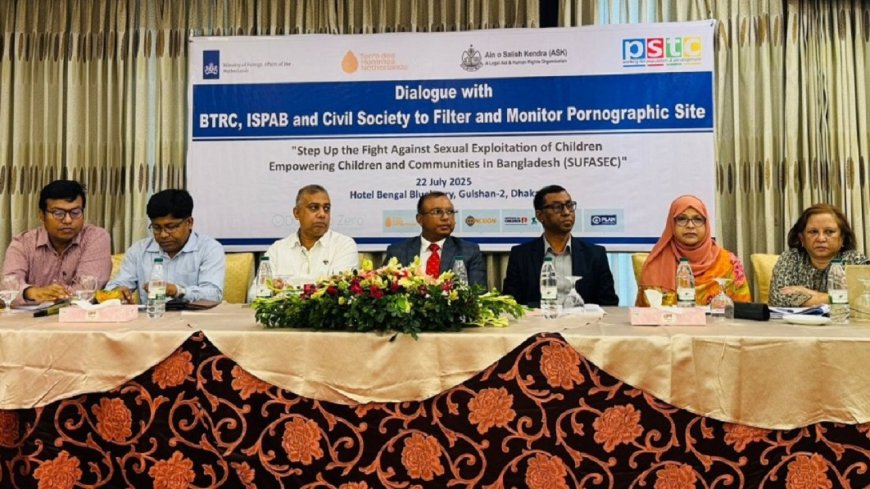Safeguarding Screens: Stakeholders Urge Unified Digital Safety Roadmap for Children

While technology has opened a world of learning for children, its unchecked use has also exposed them to heightened risks. Experts and stakeholders are voicing concern over the increasing incidents of online exploitation, cyber grooming, sextortion, and cyberbullying, calling for a comprehensive roadmap to ensure children's digital safety. The emphasis is on monitoring pornographic content, enhancing awareness, and fostering collaboration between families, schools, society, regulators, tech platforms, and law enforcement to create a child-friendly cyberspace.
On July 22, Tuesday, these concerns were highlighted at a special dialogue titled “Monitoring and Filtering of Pornographic Sites” held at a hotel in Gulshan, Dhaka. The event, themed “Ensuring Strong Resistance Against Child Sexual Abuse and Empowering Children and Communities,” was organized by Ain o Salish Kendra (ASK) in collaboration with Terre des Hommes Netherlands (TdH Netherlands). Representatives from NGOs, Bangladesh Telecommunication Regulatory Commission (BTRC), Internet Service Providers Association of Bangladesh (ISPAB), and civil society participated in the dialogue.
Presenting the keynote on pornographic site surveillance and filtering, ASK Executive Council Member Tahmina Rahman stated that children’s unfiltered access to digital spaces was leading to increasing exposure to harmful content and predators.
Growing Online Abuse
Speakers observed that the use of Facebook, WhatsApp, Instagram, gaming, and chat apps is rapidly increasing among children and adolescents. With this rise comes an alarming uptick in crimes like cyber grooming and online sexual abuse. Perpetrators often hide their identities and build emotional connections with children, gradually involving them in sharing inappropriate content, images, and videos—leading to psychological trauma and exploitation.
Due to social stigma and fear, many children and families hesitate to seek legal help, speakers noted.
Call for Collaborative Action
Experts emphasized that securing children online is not the sole responsibility of families but requires coordinated action from ISPs, regulators, civil society, and technology companies. "To combat child sexual abuse, awareness must begin at home while fostering a friendly relationship between parents and children," they said.
They stressed the need for blocking pornographic sites by developing updated blacklists, implementing DNS filtering and firewalls, launching child-safe browsing platforms, and creating simple reporting mechanisms for citizens. In addition, legal monitoring and auditing frameworks must be made effective alongside ongoing awareness campaigns.
The session was moderated by ASK Advisor Mabrook Mohammad. Brigadier General S. M. Moniruzzaman, Director General of BTRC, attended as chief guest. Other notable guests included Md. Shariful Islam, System Analyst at the Department of ICT; Nargis Sultana Zeba from the Department of Women Affairs; ISPAB President Aminul Haque and Vice President Neyamul Haque Khan; and TdH Netherlands Country Manager Nazrul Islam.









































































































































































































